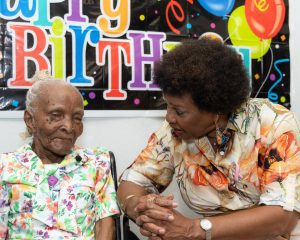When you hear the term “Active Ageing”, you tend to conjure up images of the elderly taking brisk walks, jogging, dancing or getting involved in some type of physical activity. But, that is only part of the picture.
Active Ageing: Good Health Adds Years to Life, is the theme for World Health Day, which will be observed this Saturday, April 7. According to consultant gerontologist at the Geriatric Hospital, Dr. Ambrose Ramsay, active ageing starts from the womb – so to speak.
It is adopting and maintaining a healthy, active lifestyle throughout one’s life, in order to have a high quality of life in the latter years.
“…And, that is important because we tend to see the effects of poor lifestyles from middle age into old age because as people get older, there are a combination of factors impacting on the body – the ageing factors plus the disease factors. They come together and cause disability, loss of mobility, loss of memory and dementia, obesity, osteoarthritis and its effects, and diabetes and its effects.
“When those chronic diseases are added on to the ageing effect, you get older people who are disabled, and with our growing ageing population you are going to get a lot of older disabled people that the country will have to deal with and health care will become a major concern. Older people tend to consume the majority of the health care budget because of the changes due to age and the chronic diseases from which they tend to suffer,” Dr. Ramsay explained.
It is no secret that Barbados has an ageing population, which the World Health Organisation (WHO) defines as “when the proportion of people over age 60 grows faster than any other age group, as a result of both longer life expectancy and declining fertility rates.”
The 2000 census showed that there were over 41, 000 people in Barbados aged 60 and over; that figure is sure to have increased in the last decade. Barbados also has the second-highest rate of centenarians per capita in the world. With a population of approximately 270 000 people, it is estimated that there is one centenarian for every 2, 500 people.
The WHO estimates that within the next five years, the number of adults aged 65 and over worldwide, will outnumber children under the age of five. And, by 2050, these older adults will surpass children under the age of 14. This is unprecedented, and low to middle-income countries like Barbados are expected to experience the most rapid and dramatic demographic changes.
Population ageing can be seen as a success story for public health policies and for socio-economic development, but it also challenges the society to adapt, in order to maximise the health and functional capacity of older people as well as their social participation and security.
The Government of Barbados is working on a National Policy on Ageing which will seek to institute a number of programmes and policies to benefit the elderly. The recommendations include: the creation of a National Machinery for Older Persons’ Affairs, namely a Department of Elder Affairs and an Advisory Commission; legislation to protect the elderly against discrimination and abuse and to ensure safety in the physical environment; public and individual strategies to provide financial and economic security; education and training, as well as the protection and security of elderly persons.
Dr. Ramsay noted that, ideally, everyone’s goal should be that of ageing satisfactorily. That is, reaching old age without the burden of disease. This would mean elderly persons could care for themselves longer without needing immediate intervention from relatives, private care institutions or government.
“That is why we try to encourage people to get back to healthy lifestyles which include: healthy eating, physical activity and also maintaining mental activity and social networks. Those things help to keep people to live longer. If you have friends or something to do, you will have a better quality of life than someone who has no relationships. So socialisation is important,” the doctor underlined.
While many people are searching for the fountain of youth in the form of pills, creams etc., “exercise has produced the best results to date”, Dr. Ramsay asserted.
He also emphasised that undesirable habits such as smoking and excessive drinking of alcohol could pose significant health risks.
“Even things like wearing your seatbelt when driving. These are some of the things that will help you to get there. Of course, regular health checks are also important. If you don’t have any medical illnesses, you should still get checked because detecting diseases early can stave off disabilities in older persons,” Dr. Ramsay pointed out.
The Government of Barbados has put in place a number of programmes aimed at improving the quality of life of older persons. It conceptualised the annual National Senior Games, which comes off on Saturday, April 21, this year, as a means of keeping them active.
In addition, the National Assistance Board runs 15 activity centres across the island where senior citizens can socialise, do art and crafts, and showcase their vast range of talents.
The Ministry of Health, through the National Task Force on Physical Activity and exercise, also conducts a number of activities to keep people of all ages active through its Get Moving Barbados campaign. And, in keeping with the theme “Active Ageing” on World Health Day, it will be holding the event, Exercise in the City, in Independence Square, the City, at 6:00 a.m. on Saturday.





